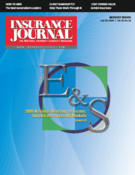What does it take to deliver outstanding customer service? Kimberly J. Muesse, a senior account manager with the Lockton Cos. in Houston, should know: She’s won a string of awards during her 25-plus years in the insurance industry, the most recent being named the Accredited Customer Service Representative (ACSR) of the Year by the Independent Insurance Agents & Brokers of America.
The Big “I” said Muesse stood out among the candidates for the ACSR of the Year honor because she consistently goes beyond the call of duty. Her professionalism, time management skills and exceptional work ethic were among her many attributes highlighted in letters recommending her for the prestigious award.
In this recent interview with Insurance Journal, Muesse shares the secrets of her success and what she sees as best practices for insurance CSRs.
Insurance Journal: What kinds of service do business customers want?
Kimberly Muesse: They expect precision customer service. What do I mean by precision customer service? They want what they want, when they want it and at a price these days that they are willing to pay. And as insurance professionals we’d better be able to deliver that or they will go look somewhere else.
IJ: What practices should agencies follow to assure customers get what they need?
KM: When you’re trying to place coverage you have to go to multiple markets. When you look at those markets you not only have to look at the price but you have to look at their products as well. For the price that clients are paying these days they want everything possible that they can get. It’s up to us to be able to find it.
IJ: How can insurance professionals enhance the quality of their customer service?
KM: My adage is to always deliver what I promised, when I promised, but to excel at that promise. I always have to go beyond that and deliver better and more, ahead of the deadline I set. It’s the concept of going above and beyond.
IJ: Do you try to assess things that clients maybe have not thought about?
KM: Always. That’s part of the reason we are here, because they may be thinking only inside of the box. Part of the reason they have us working for them is for us to think outside of the box. We think of the “what ifs.” What’s keeping them up at night? Or maybe it’s not keeping them up at night and it should be. That’s where we come in. When we do think of an item that they may need, not only do we suggest it, we need to have a solution in order to provide that coverage for them.
IJ: How do clients they are receiving value in their insurance decisions?
KM: We make sure we bring them more than just products and price. Specifically at Lockton, not only do we bring that, but we bring our expertise and our knowledge and additional service to our clients. Because that’s what adds the value to them.
IJ: Is constant staff retraining on technology necessary as it evolves?
KM: I wouldn’t say retrain, I would say refresh. For example, when an agency migrates to a new version of Microsoft Office, there will always be new bells and whistles on the newer version. You’re not going to have to go back to the basic training; you’re going to be trained on the updates.
And that’s always important. If you update the technology but don’t let people know what the new bells and whistles are, they’re not going to utilize it.
IJ: How can agencies develop and retain great CSRs?
KM: The real estate adage is location, location, location. My reply to that one is education, education, education. I see education as a key. At Lockton Houston we are very lucky in that we offer the ACSR program in-house.
Our office is dedicated to that program. We have an associate staff development consultant here that takes care of that.
We have somebody here in the Houston office that has been doing a series of in-house risk management classes. We also implemented an internal training program for individuals with no insurance experience at all.
IJ: How would you describe the quality control process you call “record and recite?”
KM: In a nutshell, sometimes in communications, whether it’s written or verbal, what the speaker says and what the listener hears aren’t absolutely the same thing.
With record and recite, I make sure that in a verbal conversation I’m recording and documenting that information.
And before I take action on it, I recite it to make sure that my understanding is the same understanding as the person who was giving directions.
Topics Talent Training Development
Was this article valuable?
Here are more articles you may enjoy.


 Allstate CEO Wilson Takes on Affordability Issue During Earnings Call
Allstate CEO Wilson Takes on Affordability Issue During Earnings Call  Q4 Global Commercial Insurance Rates Drop 4%, in 6th Quarterly Decline: Marsh
Q4 Global Commercial Insurance Rates Drop 4%, in 6th Quarterly Decline: Marsh  Zurich Insurance’s Beazley Bid Sets the Stage for More Insurance Deals
Zurich Insurance’s Beazley Bid Sets the Stage for More Insurance Deals  Lawyer for Prominent Texas Law Firm Among Victims ID’d in Maine Plane Crash
Lawyer for Prominent Texas Law Firm Among Victims ID’d in Maine Plane Crash 


